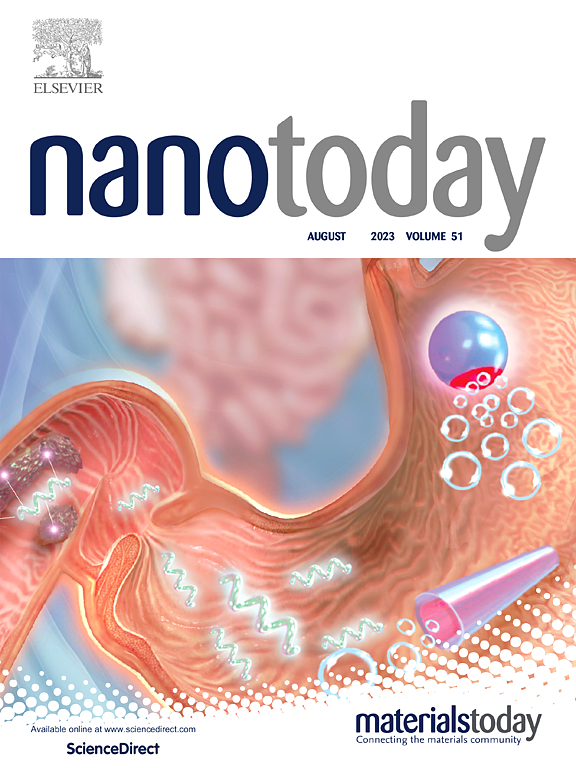Regulation of signaling pathways by metal and metal-doped nanozymes in inflammatory bowel disease: A therapeutic perspective
IF 10.9
1区 材料科学
Q1 CHEMISTRY, MULTIDISCIPLINARY
引用次数: 0
Abstract
Inflammatory bowel disease (IBD) is a chronic condition driven by oxidative stress and dysregulated immune responses. Key pathways like nuclear factor-kappa B (NF-κB) and Janus kinase/signal transducer and activator of transcription (JAK/STAT) play pivotal roles in IBD pathogenesis. By altering these pathways, pro-inflammatory cytokines including TNF-α, IL-6, and IL-1β are suppressed, lowering inflammation and re-establishing immunological balance. Novel treatments for IBD have been developed using metal-based nanozymes that are designed to replicate natural enzymatic processes. These nanozymes, including iron-doped, zinc-doped, ceria-doped, transition metal-doped, and noble metal-doped variants, exhibit robust catalytic activities, such as superoxide dismutase (SOD)-like, catalase (CAT)-like, and peroxidase (POD)-like functions. By scavenging reactive oxygen species (ROS) and restoring redox balance, they mitigate oxidative stress, a key driver of IBD progression. These nanozymes interact with important signaling pathways linked to IBD in addition to their enzymatic roles. They inhibit NF-κB signaling, reducing the release of pro-inflammatory cytokines, and regulate the JAK/STAT pathway to balance immunological responses. Their therapeutic potential is increased by this dual action, which concurrently addresses immunological dysregulation and oxidative stress. Metal-doped nanozymes are a promising substitute for conventional anti-inflammatory and immunosuppressive therapies due to their precise, targeted action. The review article explores the latest developments in metal based nanozyme research, their catalytic characteristics, and how they affect IBD treatment, as well as potential future paths for the area.
炎症性肠病中金属和金属掺杂纳米酶的信号通路调控:治疗角度
炎症性肠病(IBD)是一种由氧化应激和免疫反应失调驱动的慢性疾病。核因子-κB (NF-κB)和Janus激酶/信号转导和转录激活因子(JAK/STAT)等关键通路在IBD发病过程中起关键作用。通过改变这些途径,促炎细胞因子包括TNF-α、IL-6和IL-1β被抑制,降低炎症,重建免疫平衡。利用金属基纳米酶已经开发出治疗IBD的新方法,这种纳米酶被设计用来复制自然酶促过程。这些纳米酶,包括铁掺杂、锌掺杂、铈掺杂、过渡金属掺杂和贵金属掺杂的变体,表现出强大的催化活性,如超氧化物歧化酶(SOD)样、过氧化氢酶(CAT)样和过氧化物酶(POD)样功能。通过清除活性氧(ROS)和恢复氧化还原平衡,它们减轻了氧化应激,这是IBD进展的关键驱动因素。除了它们的酶作用外,这些纳米酶还与与IBD相关的重要信号通路相互作用。它们抑制NF-κB信号,减少促炎细胞因子的释放,调节JAK/STAT通路平衡免疫反应。它们的治疗潜力增加了这种双重作用,同时解决免疫失调和氧化应激。金属掺杂纳米酶由于其精确的靶向作用,是传统抗炎和免疫抑制疗法的有希望的替代品。本文综述了金属基纳米酶研究的最新进展、它们的催化特性、它们如何影响IBD治疗,以及该领域潜在的未来发展方向。
本文章由计算机程序翻译,如有差异,请以英文原文为准。
求助全文
约1分钟内获得全文
求助全文
来源期刊

Nano Today
工程技术-材料科学:综合
CiteScore
21.50
自引率
3.40%
发文量
305
审稿时长
40 days
期刊介绍:
Nano Today is a journal dedicated to publishing influential and innovative work in the field of nanoscience and technology. It covers a wide range of subject areas including biomaterials, materials chemistry, materials science, chemistry, bioengineering, biochemistry, genetics and molecular biology, engineering, and nanotechnology. The journal considers articles that inform readers about the latest research, breakthroughs, and topical issues in these fields. It provides comprehensive coverage through a mixture of peer-reviewed articles, research news, and information on key developments. Nano Today is abstracted and indexed in Science Citation Index, Ei Compendex, Embase, Scopus, and INSPEC.
 求助内容:
求助内容: 应助结果提醒方式:
应助结果提醒方式:


